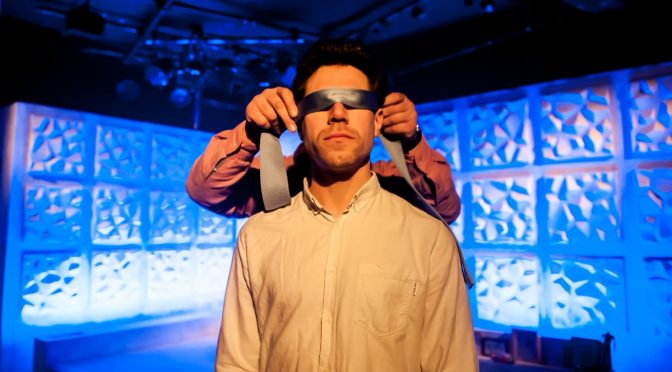As this is his first full-length play, it’s tempting to assume that Tom Ratcliffe is a young man. Regardless, his writing contains prodigious insight. There are so many intelligent observations in Circa that it might be thought of as a wise play, one that stays with you and makes you think. Following one man at three different life stages to explore the theme of loneliness, Ratcliffe seems capable of writing for any age, with dialogue that is consistently strong and often funny. Issues that could have hashtags and heavy debates about heteronormativity are delivered with ease. The neat conceit of covering three decades in its protagonist’s life is ultimately mishandled, and the play ends terribly but, with the aid of director Andrew Twyman, Circa is a particularly impressive failure.
As a young man, our hero encounters sexual violence. In his 30s he tries to settle down, no matter what the compromise. Then in later life he ends up dating online. All this is sensitively performed by Daniel Abelson, Thomas Flynn and Antony Gabriel. And they are ably supported by Joseph Rowe as two very different love interests. Twyman’s efforts to provide space for all this are admirable but there are too many issues touched on too quickly. While the play isn’t without surprises (which includes a fantastic role for the excellent Jenna Fincken), the tone is too insistently melancholic.
The biggest problem is also Ratcliffe’s boldest move – to take us strangely out of time and focus on characters. The isolated emphasis on emotional motivation in the play is sharp, but other considerations are too stripped back. It leads to confusion and a disappointingly hollow feel as a whole. There’s little background for our hero, more but not much for some of his sexual encounters. For all the time we spend with the guy, and the three performer’s efforts to make him appealing, the poor fellow doesn’t even get a name. It’s an interesting point of contrast – many plays with gay characters take obsessive care over the community’s history while here the past seems deliberately avoided. It makes Circa novel but, as the title indicates, it also makes positioning the play in time a frustrating, distracting difficulty. Ratcliffe could argue that it is not his focus – fair enough – but he contradicts himself; with a final scene set in the future in which the piece crashes to a conclusion. The idea that the problem of loneliness is getting (inevitably?) worse is sprung on us with surprising ineptitude. A piece that felt so personal flares out pointlessly and ends up insubstantial. It’s a shock when so much else about the play is admirable.
Until 30 March 2019
Photo by Lidia Crisafulli.

